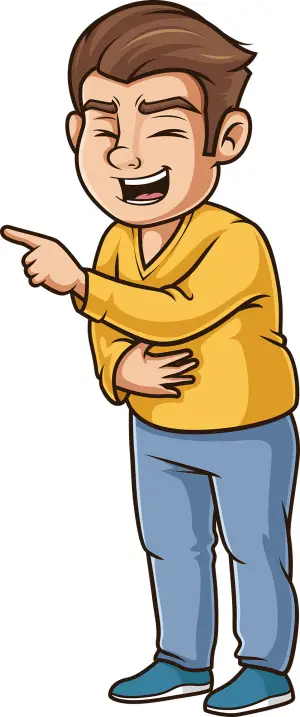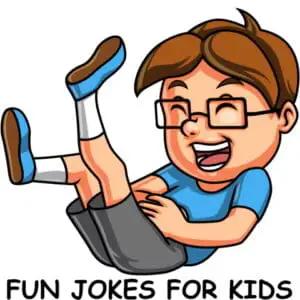Many adults nowadays seem to enjoy dark humor, as proven by its rise in popularity over the years. But it’s surprising to me how dark humor has trickled down into mainstream kids entertainment. Am I the only one concerned by this? What should parents know about dark comedians and dark humor in general as it pertains to their kids?
Dark comedians aren’t targeting kids as their audience, or shouldn’t be. Though dark humor is even in Marvel and other superhero films (which appeal to kids), material by dark comedians isn’t appropriate for nor truly understood by most kids, so dark humor should be limited in kid entertainment.

As a mom (and former teacher), I’ve used humor over the years quite strategically, and honed my comedic skills through experience. Humor is a great kid motivator and classroom management tool!
One way to build humor with your kids is to use it strategically through routines or regular activities. For instance, our Fun Jokes For Kids Coloring Book is a great tool for embedding humor through kid-friendly activity.
But I’ve shied away from dark humor with kids because I’ve always thought that was clearly a no-no. However, maybe I’m in the minority here, since more and more children’s programming has started including it. And many dark comedians are quite popular with even elementary aged kids!
Contents
What is dark comedy? An Overview-
Let’s look at what’s meant by dark comedy, and by extension, dark comedians, before moving on to whether or not they’re okay for kids.
Dark comedy is humor that is twisted, cynical, incongruent, and/or unexpected. Dark comedians find humor in things that aren’t typically or overtly funny, and figure out ways to shift expectations to a comical outcome. To do this, dark comedians often incorporate sarcasm, irony, and satire.
Examples are a natural way to put unfamiliar terms or concepts concretely. Here are some examples to explain dark humor.
Examples of Dark Humor
Two Dark Humor Shows:
- Donny Darko (check it out on Amazon)– The main character in this film starring Jake Gyllenhaal is haunted by a large bunny. Bunnies aren’t typically expected to be sinister or scary so it’s dark humor.
- It’s Always Sunny in Philadelphia (also available on Amazon)– Whether you’re looking at it literally or figuratively, it’s not sunny for the characters of this popular TV show, whose schemes and shenanigans always fail, and agreeably take very dark and twisted turns.
Two Dark Humor ‘Jokes’:
- ‘A woman is leaving a grocery store and someone says she accidentally left her child in the cart behind her. She replies nonchalantly, “nope”.’
- ‘A couple says they’ve decided they don’t want kids. So then, they ask who wants theirs.’
Two Dark Humor Situations:
- Finding humor in death
- When grandma is depicted as evil
Other articles similar to this one that you might want to look at afterwards:
- Explaining Cruel Humor to Kids (Versus Dark or Crude Humor)
- Is Marvel Humor Child Friendly? (Dark Humor And Kids)
- Should You Be Concerned About A Dry Personality For Kids?
- What You Should Know About Wry Humor (Teacher Explained)
Are dark comedians offensive?
Is a dark comedian a bad person? This is a question that might come up as you approach the concept of dark comedy with your kids.
Dark comedians are sometimes offensive. They often offend, directly or indirectly, as they push boundaries to find humor under conditions and in situations typically not seen as funny. This tends to be politically incorrect, too. But, this can be enjoyable and even therapeutic in the right context.

It’s why we have comedy, right? To laugh at sad, painful things.
Matt Spicer, Hollywood writer/director of dark comedies
One of the biggest complaints about dark comedians is that they use taboo subjects in their comedy, things that just aren’t funny by accepted social norms and mores.
Dark comedians will joke about death; cancer; racism; abuse; and alcoholism. Most everyone will agree that these topics are very serious and tragic, and not at all funny. Yet, a dark comedian has no problem cracking jokes about any of them!
But some say that this is actually a good thing. Because these subjects are so solemn and even heartbreaking at times that laughter is indeed the best medicine. And there’s research to back this up!
For one, it makes it easier to approach taboo subjects when you incorporate humor, so by making fun of something serious and tragic, dark comedians open up the dialogue- for some, that is.
As well, research has also shown that dark humor is beneficial during crisis situations. It’s even been used as a coping mechanism for POWs.
However, this doesn’t mean dark comedians should be your kiddo’s hero either.
Keep in mind that the bulk of the comedic material used by dark comedians is not appropriate for kids under 12 in most cases. Rape, violence, and mental illness, for instance, shouldn’t be dealt with as a punchline with children. When it’s time to discuss these serious issues with your kids, you’ll want them to understand the gravity of it, not that it’s something to joke about.
It’s only after you’ve become an adult, in most cases, when you’re capable of dealing with these mature situations with a humor-approach, and still take them seriously.
In addition, dark humor requires a higher level of intelligence and emotional understanding. Dark humor is built with layers, innuendo, and multiple meanings. It requires deduction and inference ‘to get it.’
And kids just typically aren’t able or ready to do this. The jokes go over their heads.
Even as children start to grasp multiple meanings and context-conditioning, dark humor is generally out of reach until much older adolescence, except in cases of gifted children. And again, in those cases where kids are able to mentally ‘get the joke’, the subject matter is more than likely not age-appropriate.
Should Kids Like Dark Comedians?
The hard part for many parents is that kids end up idolizing dark comedians. I know as a teacher I was shocked to learn that my 3rd and 4th graders were privy to many dark comedians via YouTube, Netflix, and such. What’s the best way to handle this, other than unplugging devices?
Kids should not like dark comedians or dark comedy because the material is too mature or over their heads. The difficult part is that dark comedy has infiltrated child entertainment from Marvel films to SpongeBob SquarePants, so that kids are exposed to dark comedians and dark comedy too soon.
For example, Chris Rock was a popular comedian with my elementary-aged students. Although I consider his comedy funny (and to be clear, even his TV show has elements of dark comedy), most of his comedy material is not kid-appropriate, even if Rock and Hollywood say so.
While just about all parents will agree that Chris Rock Stand-Up is not for kids, most would not have any problem letting their elementary-aged kids watch Everybody Hates Chris. But even this kid-based and kid-acted comedy is dark. Though it’s spun as a family show, it exposes kids to ‘dark comedy’, with just the title alone (think about it). And while admittedly the show as a whole seems kid-appropriate, it’s sprinkled with dark humor throughout by poking fun at family dysfunction; racism; the black market; double standards; and poverty, just to name a few examples.
And of course, it’s not a surprise that the show is semi-biographical about the life of comedian, Chris Rock, so it’s going to address some ‘big’ issues common to his childhood. And watching this, it becomes a natural segue into the other, much darker, comedy of Rock.
Now keep in mind, that kids who gravitate to dark humor aren’t bad either. Kids like dark humor, much like adults do. It’s risqué; salacious; and sarcastic. It has a rebellious feel that naturally attracts kids because it seems like something they shouldn’t be watching/listening to/or doing.
In fact, kids who like dark comedy, also like adults, may even have a higher intelligence and emotional stability. Of course, it could just be that they want to feel ‘grown up’ so they say they like it, even if they don’t understand it.
Regardless, parents should use caution anytime kids are exposed to dark humor, whether it’s Disney-fied or not.
When dark humor is recognized in kid films and shows like Marvel movies, SpongeBob SquarePants, or other, parents should talk with kids about what makes it funny; what makes it ‘dark’; and explain how to keep it in proper perspective.
Why Do People Like Dark Comedy?
So what is it that causes people to enjoy dark humor? What kind of person tends to prefer it over other types of humor?
People like dark comedy because it makes taboo subjects approachable and is a way to cope with uncomfortable situations or events. Finding comedy in the unexpected and incongruent can be refreshing and provides a safe way to handle frustrations without acting out that would involve repercussions.
And to be clear, those who like dark humor aren’t actually depraved or dumb as some might initially think, considering dark humor is, well, ‘dark.’ It’s actually quite the opposite.
Research tells us that people who prefer dark comedy have high intelligence, more education, low mood disturbance, and less aggression than those who don’t. But also, those who prefer dark humor tend to be rebellious or not afraid to ‘buck the norm’. Men also prefer dark humor more than women.
In addition, dark humor is conditional u[on people’s moods, so coincidently people are less likely to enjoy dark humor if they’re in a ‘dark mood.’
Dark Comedians Versus Dry/Deadpan Comedians
Are dark comedians the same as dry comedians or deadpan comedians?
Dark comedians and dry or deadpan comedians are similar but not exactly the same. Dark comedians find humor in unexpected, solemn, or even tragic events whereas dry/deadpan comedians are more about delivery and tone and lacking expression. Both commonly use sarcasm.
- A dark comedian will poke fun at taboo subjects like murder, mental illness, and addiction.
- A deadpan or dry comedian will provide snarky or snide observations about everyday life.
| Dark Comedian Example | Dry/Deadpan Comedian Example | Dark, Dry Comedian |
|---|---|---|
| Bill Burr | Bea Arthur | Ricky Gervais |
Is Dark Comedy and Black Comedy the Same?
So if dark comedy and deadpan/dry comedy aren’t exactly the same, what about dark comedy and black comedy?
Dark comedy and black comedy refer to the same type of humor. This humor is twisted, cynical, and/or unexpected. Dark humor shifts expectations from what’s typically funny to finding humor where it’s not usual. Other words for dark and black humor are morbid humor, gallows humor, and macabre.
Because dark humor/comedy helps us address uncomfortable situations by easing tension with laughter, it’s become much more common and popular in our media, even for kids entertainment. Here are some examples of this (with links to viewing on Amazon).
- Some of the more acclaimed and respected dark comedies in recent years are Fargo; Once Upon A Time in Hollywood; Knives Out; and Parasite . All have won multiple critics awards, some including the coveted Oscar!
- Popular kids shows with decidedly dark elements in recent years: The Adams Family; Goosebumps; Coraline; and A Series of Unfortunate Events.
Many of these kid versions actually started out as children’s literature too! And as a teacher, I guess I must admit that the themes of many acclaimed children’s tales are quite dark and grim, even while trying to be funny!
The Punchline for Dark Comedians Explained
So the punchline of dark comedies for kids is that it’s best to leave dark humor out. While kids may find some unexpected and twisted humor funny, it’s really above most children’s ability to grasp and the content is usually more mature than appropriate.
However, due to popularity, kids will be exposed to dark comedy and dark comedians since it’s permeated much of mainstream media, including what’s labeled as kid entertainment. In this context then, parents should talk with their kids to explain how dark humor is being used.
For more articles about related to dark humor, I recommend these:
